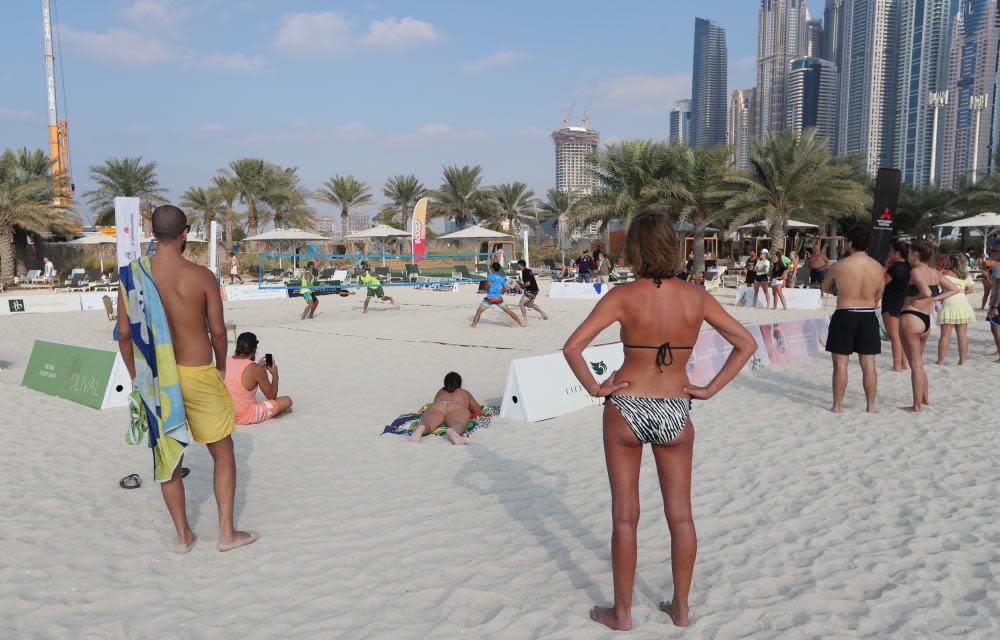UAE added to UK’s growing travel ban list in blow to influencers

British people including social media influencers flying home from Dubai could face a mandatory 10-day quarantine stay in a hotel, as the United Arab Emirates is being added to the UK’s growing travel ban list.
The UAE, Burundi and Rwanda will join the 30 locations already on the so-called “red list” from 1pm on Friday, the transport secretary, Grant Shapps, announced, in order to prevent the spread of the Covid variant that first emerged in South Africa.
Under measures unveiled on Wednesday, those who are still able to return from countries on the travel ban list – British and Irish nationals, as well as those with UK residency rights – will be required to quarantine in hotels for 10 days on their arrival, without exception.
But the hotel quarantine policy has not yet been implemented, with the government due to set out further details next week. It potentially leaves the door open for those who can return from banned countries beforehand to avoid the requirement – although they would still have to self-isolate at home for 10 days with their household.
The home secretary, Priti Patel, used a statement detailing the hotel quarantine measures to the Commons on Wednesday to criticise influencers who have been posting pictures from overseas. “We see plenty of influencers on social media showing off about which parts of the world they are in, mainly in sunny parts of the world. Going on holiday is not an exemption and it is important that people stay at home,” she said.
Some influencers in Dubai who have drawn scrutiny in recent weeks have tried to indicate that their overseas travel has been a necessary part of their work, including to appear in videos and paid-for endorsements.
Under current UK Covid-19 restrictions, people must stay home and not leave to travel unless they have a legally permitted reason to do so, such as work.
On Wednesday the government also announced that a new requirement would be introduced for people who wish to travel abroad to make a declaration stating why they need to do so, with the reason checked by carriers before departure.
Police presence will be increased at ports and airports, and people will be fined if they are in breach of the stay-at-home regulations. Patel told the Commons: “Anyone who does not have a valid reason for travel will be directed to return home or they will face a fine.”
On Thursday the prime minister’s official spokesperson echoed Patel’s stance on influencers. “She said yesterday that we see plenty of influencers on social media showing off where they are in the world – mainly sunny places,” he said. “Going on holiday is not an exemption and it is important that people stay home. We’ve been clear that people shouldn’t be leaving the UK for the purpose of holidays. We are asking people to stay home and only travel for absolutely essential reasons.”
The curbs announced on Wednesday are on top of existing restrictions, which mean international arrivals, including those from countries not on the banned list, have to self-isolate for 10 days when they reach the UK and provide proof of a negative coronavirus test taken up to 72 hours before departure, although there are some exemptions for certain work-related trips.
In England under the Test to Release scheme, those who have returned from countries not on the travel ban list can leave self-isolation earlier if they pay for a Covid test five full days after their arrival that returns a negative result. The UK travel ban list mainly covers countries in South America and southern Africa as well as Portugal and Cape Verde.
The Department for Transport said that from 4am on Friday all arrivals from the UAE, Burundi and Rwanda would not be eligible for the Test to Release scheme and would have to self-isolate immediately with their households.
There will also be a ban on direct passenger flights from UAE from 1pm on Friday. The DfT said: “British nationals currently in the UAE should make use of the commercial options available if they wish to return to the UK. Indirect commercial routes that will enable British and Irish nationals and residents to return to the UK continue to operate.”


